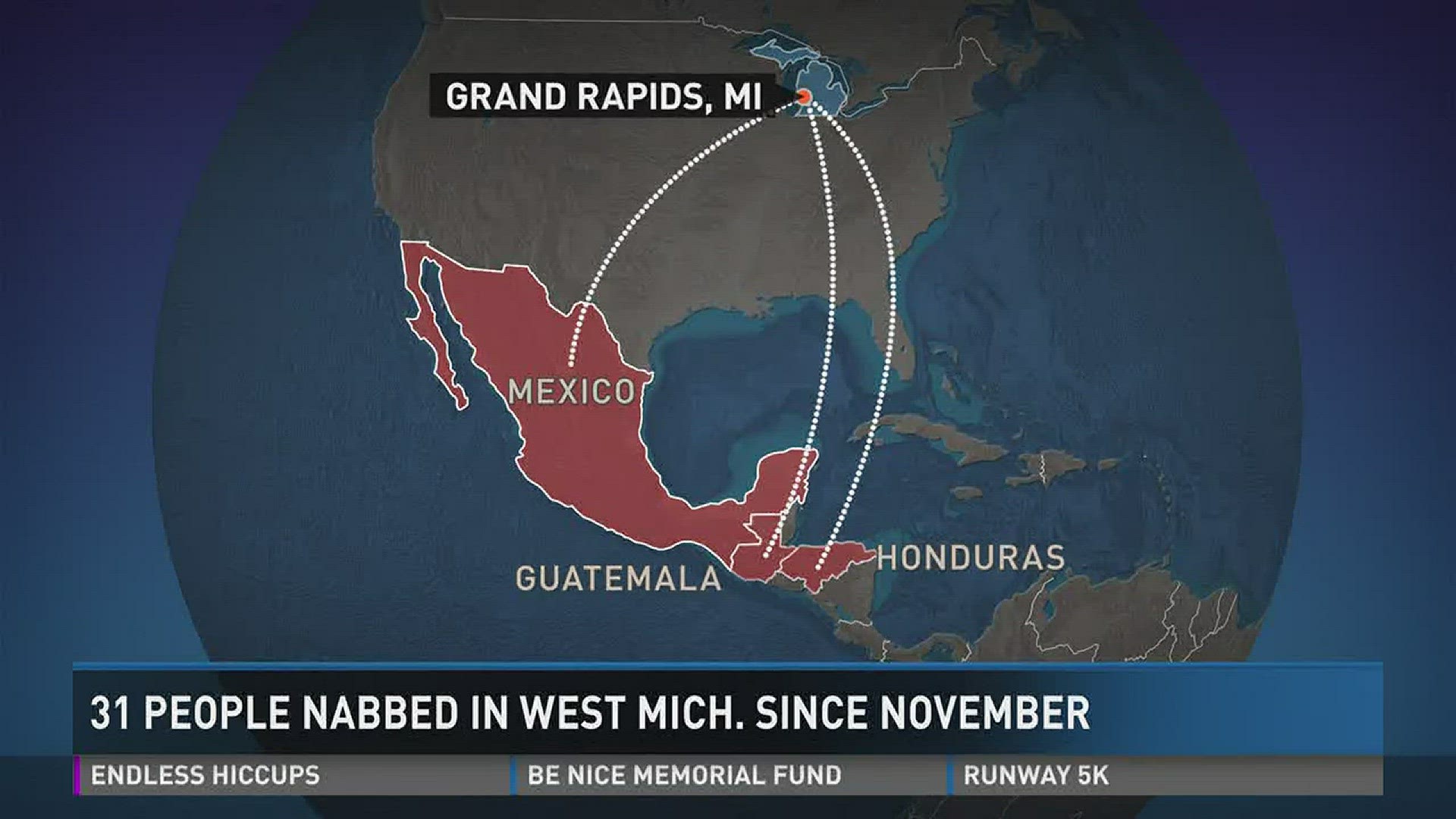Federal authorities in West Michigan have nabbed at least 30 people they say are in the U.S. illegally, including a Kent City man who fought with a Sparta police officer during a drunk driving stop in November.
The 30 cases filed since November are for offenses ranging from illegal reentry to possession of fraudulent documents. More than half of the cases are from Kent County, a review of federal court records shows.
Some of the defendants have been indicted, others are named in criminal complaints. Several have been deported numerous times, including a Mexican national nabbed last month by U.S. Border Patrol agents in Antrim County. He’s been deported 10 times, federal court records show.
Several have prior felony convictions for crimes ranging from sexual assault to drug trafficking. Most are here from Mexico and Central America.
Among those arrested is Diego Hernandez-Cortes, 33, who lists an address in Kent City. Police have been looking for him for more than a year after he missed a court appearance for an April, 2015 drunk driving arrest in northern Kent County. The federal government also wanted him for making a false claim of being a lawful resident.
Sparta police caught up with him on Thanksgiving day following a single-vehicle accident outside Sparta Lanes Bowling Center on North State street.
A responding officer reported that Hernandez-Cortes appeared drunk; an open beer was found in his car. Hernandez-Cortes resisted arrest; he and the officer fell to the ground during a struggle.
After he was arrested, police found an AR-15 rifle in his vehicle loaded with several rounds of .223 caliber ammunition.
Court records show Hernandez-Cortes had been living in Kent City, but has no permanent address. He was charged with four offenses, and pleaded guilty last month to attempted assault of a police officer and drunken driving.
Hernandez-Cortes was assessed $980 in fines and court costs and given credit for 45 days served in the Kent County Jail. Upon his release, he was picked up by Oceana County officials for a November car theft. The feds caught up with him last week.
Hernandez-Cortes appeared in U.S. District Court in Grand Rapids on Tuesday, Feb. 21 for arraignment on five felony charges, including alien in possession of a firearm, false claim of lawful permanent resident status, misuse of a social security number and possession of false identification documents. Authorities seized two Social Security cards and three Permanent Resident cards.
The 30 cases originate from seven counties covered by the U.S. Attorney’s Office for the Western District of Michigan. Kent County had 17 cases, followed by Berrien County, with four.
Misuse of a Social Security number resulted in 11 charges, including one of the five charges filed against Hernandez-Cortes. He’s accused of providing a bogus social security card to get a job at an Oceana County vegetable farm last spring.
The most common offense is alien reentry. The list includes Gustavo Alexis Hernandez-Padilla, who, since 2012, has been sent back to Honduras three times. A fourth trip awaits.

Hernandez-Padilla, 25, was arrested by Grand Rapids police in December for operating without a license. He was 12 years old when Border Patrol agents nabbed him in Texas. He was first returned to Honduras in 2012 following an arrest in Grand Rapids. He was flown back to Honduras in Aug. 2014 and again that October.
Hernandez-Padilla was released from the Kent County Jail in December before agents from U.S. Immigration and Customs Enforcement (ICE) were notified, federal court records show. ICE agents caught up with him as he left his home in Grand Rapids last month.
A Jan. 26 federal indictment says Hernandez-Padilla, being an alien who had been previously removed, was found in the United States without having obtained the express prior consent of the Attorney General or the Secretary of Homeland Security to return or reapply for admission. The offense is punishable by up to two years in prison.
Hernandez-Padilla pleaded guilty to the charge three weeks ago and appeared in federal court for sentencing on Tuesday.
Sentencing guidelines called for a prison term of zero to six months. U.S. District Court Judge Gordon J. Quist sentenced Hernandez-Padilla to time already served and waived any fines.
In a sentencing memorandum, defense attorney Daniel Garthe said Hernandez-Padilla’s mother left Honduras for the United States when he was six, leaving him with his grandmother. The grandmother died three years later.
A friend of the family brought Hernandez-Padilla to the U.S. in 2001 and he obtained a permit at the border. Unbeknownst to Hernandez-Padilla, he was supposed to report to immigration authorities in Detroit, Garthe wrote in the sentencing memorandum.
When he failed to appear, Hernandez-Padilla was ordered in absentia to be removed from the U.S., Garthe wrote in a sentencing memorandum. He lived in Grand Rapids with his mother and three siblings, all of whom were citizens or who became legal residents. Hernandez-Padilla attended school in Grand Rapids.
The earlier order of removal caught up with him in 2012 when, at the age of 20, he was deported to Honduras.
“In Honduras, the gangs recruited Gustavo to sell drugs and murder people, which he refused to do,’’ Garthe wrote. “Because of the gang violence in Honduras and the fact that his entire family was in Grand Rapids, Gustavo returned to the United States.’’
He was deported two more times in 2014, but returned again, eventually landing a job at a Grand Rapids construction company, where he worked for more than two years, Garthe wrote.
“Except for driving without a license, Gustavo’s only criminal history is for an open container of his friend’s beer can found in his vehicle in 2011,’’ Garthe wrote. “Gustavo will have spent over a month in jail by the time of his sentencing, to be followed by unknown more weeks in ICE custody until its next flight to Honduras.’’

